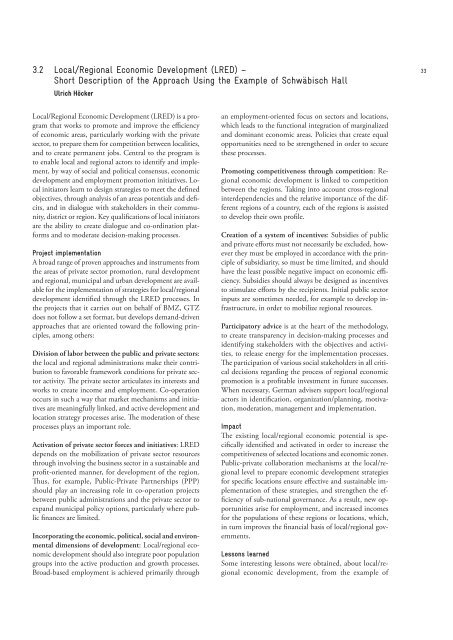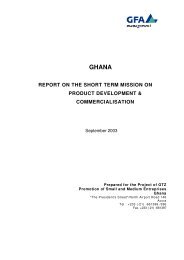Local/Regional Economic Development in South ... - Value Chains
Local/Regional Economic Development in South ... - Value Chains
Local/Regional Economic Development in South ... - Value Chains
You also want an ePaper? Increase the reach of your titles
YUMPU automatically turns print PDFs into web optimized ePapers that Google loves.
3.2 <strong>Local</strong>/<strong>Regional</strong> <strong>Economic</strong> <strong>Development</strong> (LRED) –<br />
Short Description of the Approach Us<strong>in</strong>g the Example of Schwäbisch Hall<br />
Ulrich Höcker<br />
<strong>Local</strong>/<strong>Regional</strong> <strong>Economic</strong> <strong>Development</strong> (LRED) is a program<br />
that works to promote and improve the efficiency<br />
of economic areas, particularly work<strong>in</strong>g with the private<br />
sector, to prepare them for competition between localities,<br />
and to create permanent jobs. Central to the program is<br />
to enable local and regional actors to identify and implement,<br />
by way of social and political consensus, economic<br />
development and employment promotion <strong>in</strong>itiatives. <strong>Local</strong><br />
<strong>in</strong>itiators learn to design strategies to meet the def<strong>in</strong>ed<br />
objectives, through analysis of an areas potentials and deficits,<br />
and <strong>in</strong> dialogue with stakeholders <strong>in</strong> their community,<br />
district or region. Key qualifications of local <strong>in</strong>itiators<br />
are the ability to create dialogue and co-ord<strong>in</strong>ation platforms<br />
and to moderate decision-mak<strong>in</strong>g processes.<br />
Project implementation<br />
A broad range of proven approaches and <strong>in</strong>struments from<br />
the areas of private sector promotion, rural development<br />
and regional, municipal and urban development are available<br />
for the implementation of strategies for local/regional<br />
development identified through the LRED processes. In<br />
the projects that it carries out on behalf of BMZ, GTZ<br />
does not follow a set format, but develops demand-driven<br />
approaches that are oriented toward the follow<strong>in</strong>g pr<strong>in</strong>ciples,<br />
among others:<br />
Division of labor between the public and private sectors:<br />
the local and regional adm<strong>in</strong>istrations make their contribution<br />
to favorable framework conditions for private sector<br />
activity. The private sector articulates its <strong>in</strong>terests and<br />
works to create <strong>in</strong>come and employment. Co-operation<br />
occurs <strong>in</strong> such a way that market mechanisms and <strong>in</strong>itiatives<br />
are mean<strong>in</strong>gfully l<strong>in</strong>ked, and active development and<br />
location strategy processes arise. The moderation of these<br />
processes plays an important role.<br />
Activation of private sector forces and <strong>in</strong>itiatives: LRED<br />
depends on the mobilization of private sector resources<br />
through <strong>in</strong>volv<strong>in</strong>g the bus<strong>in</strong>ess sector <strong>in</strong> a susta<strong>in</strong>able and<br />
profit-oriented manner, for development of the region.<br />
Thus, for example, Public-Private Partnerships (PPP)<br />
should play an <strong>in</strong>creas<strong>in</strong>g role <strong>in</strong> co-operation projects<br />
between public adm<strong>in</strong>istrations and the private sector to<br />
expand municipal policy options, particularly where public<br />
f<strong>in</strong>ances are limited.<br />
Incorporat<strong>in</strong>g the economic, political, social and environmental<br />
dimensions of development: <strong>Local</strong>/regional economic<br />
development should also <strong>in</strong>tegrate poor population<br />
groups <strong>in</strong>to the active production and growth processes.<br />
Broad-based employment is achieved primarily through<br />
an employment-oriented focus on sectors and locations,<br />
which leads to the functional <strong>in</strong>tegration of marg<strong>in</strong>alized<br />
and dom<strong>in</strong>ant economic areas. Policies that create equal<br />
opportunities need to be strengthened <strong>in</strong> order to secure<br />
these processes.<br />
Promot<strong>in</strong>g competitiveness through competition: <strong>Regional</strong><br />
economic development is l<strong>in</strong>ked to competition<br />
between the regions. Tak<strong>in</strong>g <strong>in</strong>to account cross-regional<br />
<strong>in</strong>terdependencies and the relative importance of the different<br />
regions of a country, each of the regions is assisted<br />
to develop their own profile.<br />
Creation of a system of <strong>in</strong>centives: Subsidies of public<br />
and private efforts must not necessarily be excluded, however<br />
they must be employed <strong>in</strong> accordance with the pr<strong>in</strong>ciple<br />
of subsidiarity, so must be time limited, and should<br />
have the least possible negative impact on economic efficiency.<br />
Subsidies should always be designed as <strong>in</strong>centives<br />
to stimulate efforts by the recipients. Initial public sector<br />
<strong>in</strong>puts are sometimes needed, for example to develop <strong>in</strong>frastructure,<br />
<strong>in</strong> order to mobilize regional resources.<br />
Participatory advice is at the heart of the methodology,<br />
to create transparency <strong>in</strong> decision-mak<strong>in</strong>g processes and<br />
identify<strong>in</strong>g stakeholders with the objectives and activities,<br />
to release energy for the implementation processes.<br />
The participation of various social stakeholders <strong>in</strong> all critical<br />
decisions regard<strong>in</strong>g the process of regional economic<br />
promotion is a profitable <strong>in</strong>vestment <strong>in</strong> future successes.<br />
When necessary, German advisers support local/regional<br />
actors <strong>in</strong> identification, organization/plann<strong>in</strong>g, motivation,<br />
moderation, management and implementation.<br />
Impact<br />
The exist<strong>in</strong>g local/regional economic potential is specifically<br />
identified and activated <strong>in</strong> order to <strong>in</strong>crease the<br />
competitiveness of selected locations and economic zones.<br />
Public-private collaboration mechanisms at the local/regional<br />
level to prepare economic development strategies<br />
for specific locations ensure effective and susta<strong>in</strong>able implementation<br />
of these strategies, and strengthen the efficiency<br />
of sub-national governance. As a result, new opportunities<br />
arise for employment, and <strong>in</strong>creased <strong>in</strong>comes<br />
for the populations of these regions or locations, which,<br />
<strong>in</strong> turn improves the f<strong>in</strong>ancial basis of local/regional governments.<br />
Lessons learned<br />
Some <strong>in</strong>terest<strong>in</strong>g lessons were obta<strong>in</strong>ed, about local/regional<br />
economic development, from the example of<br />
33



